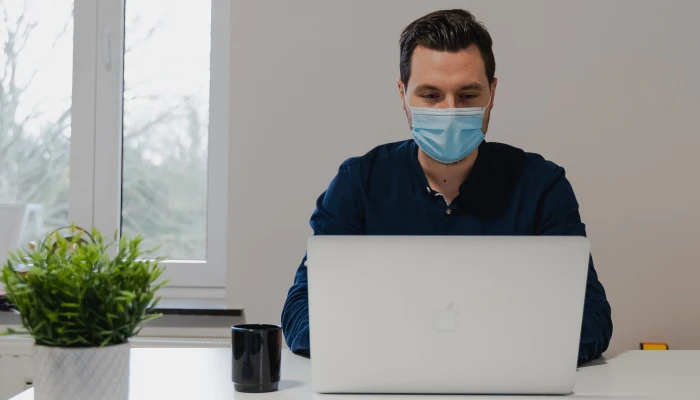R U OK at work: having a health-promoting conversation
In this 3-part interview series, I speak to En Masse Head of Psychology Dr Andrew Stock about the various types of recommended interventions at work in relation to supporting a team member with a mental health issue, with special consideration of some of the current challenges of the pandemic and working from home.
First in the series is our 13-minute chat on health-promoting conversations or checking in on others as an example of early intervention.
A transcript is available further below.
“R U OK? Day is great, Mental Health Month is great, but we all know that this is a 365-day-a-year commitment to regularly check in on each other. ”
— Dr Andrew Stock
Transcript
HK: Hello and welcome to this first episode of a three-part series on having a conversation with someone who you are concerned about in relation to their mental health. I’m Helena Kuo, I’m the managing director of En Masse, and I’m delighted to be here today with my colleague, our Head of Psychology, Dr Andrew Stock. Hello Andrew.
AS: Hi Helena. It’s good to be here – an important topic that we’re going to be talking about for sure.
HK: Absolutely. Particularly as we are coming up to RUOK? Day. So in the first podcast, which of course is this one, we’re really going to be talking about the importance of early intervention and how do we actually have that conversation with someone that we might be concerned about in terms of their mental health and wellbeing. So Andrew, given the current events, and certainly the pandemic at the moment, really interested in terms of what you’re seeing in your clinical practice of the impact of the pandemic on our mental health.
AS: I think Helena with the re-emergence of the pandemic, being a really impactful issue in many parts of Australia right now, not only is there all the typical stuff that we would expect that a lot of us have probably learned about to some extent – the impact of uncertainty, the anxiety that can sort of come upon us – also what we’re seeing is now a greater sense of helplessness and maybe even hopelessness. We’re talking about I think it was March of 2020 when Australia went into its first lockdown – that was some time ago now. So to be still struggling with the uncertainty and the anxiety, I think that’s now coupled with a sense of ‘when is this going to end?’ and for people who are actively in an extended lockdown a sense of perhaps monotony, and that lack of variation in life that can be a nice counterbalance to stress. Yes it’s a difficult time for a lot of people in Australia right now.
HK: Yes absolutely, and so you know we’re certainly looking at early intervention in your practice, and obviously the work that you do as a psychologist. What are you seeing as the benefits of actually intervening early when you might be worried about a friend or a colleague who could be struggling either because of the pandemic or it might be due to something else?
AS: Well I guess the question I ask myself is: “what is the alternative?” And there might be some people who don’t think it’s their business to ask or to check in on their colleagues or even their friends.
If we don’t, we certainly run the risk of that person continuing to suffer in silence to maybe for that sense of helplessness or hopelessness to grow and then, instead of it being early intervention, it becomes more active intervention even crisis intervention if things have really gotten to a critical point. So that’s sort of I guess what comes to my mind right away is that yes, there can be some hesitation around checking in on someone and feeling like maybe we’re overstepping, but I think the alternative of not doing – that can be far more difficult to deal with and problematic for people.
HK: Yes and I’m guessing when mental health issues have been going on for some time without any intervention, then when they do get that really active intervention the recovery time can actually be quite a lot longer.
AS: Definitely can be, and so that means that let’s pour the resources in proactively instead of being really thin with our resources by having to reactively support people.
HK: Fantastic, absolutely. So let’s have a chat about what might be some of the signs that you might notice in someone who is starting to struggle with some mental health issues?
AS: Interesting thing is what we’re starting to realise in the field is that there might be some tendencies, but what’s more poignant is that each person is an individual and they have different ways of behaving, and so with that in mind the single most important thing to notice is significant behaviour change.
If you’re dealing with someone who’s typically quite withdrawn, you know, more towards the introverted end of the spectrum, you know that’s okay, that’s not unhealthy. So if that person is being withdrawn then you don’t think, “ooh mental health issue – are they at risk?” You think, “ah no, that’s the person that I know and that’s their preferred way of being.”
But if you know that that person is actually quite typically outgoing, quite the life of the party, and then all of a sudden you notice that they’re more withdrawn, that they’re not sharing so much, they’re not participating in the Zoom meeting or whatever the context is, then you’d say to yourself, “hmm what’s going on there – that’s not like that person.”
So what we’re looking for is behaviour change. With that said, there are some things that we do look for, and I’ve already mentioned themes like helplessness, hopelessness – this sense that things are really quite difficult for a person – but perhaps even more importantly that they’re not going to get better, that they feel as though they don’t have the opportunity or the capacity to improve and for things to change in their lives. That’s a really significant thing to look out for.
HK: Yes there’s that sense of hopelessness, and certainly with a lot of us working from home at the moment it can be a bit more challenging, can’t it, to actually notice those signs relative to when people are actually seeing each other on a daily basis? But now we are constantly on Zoom calls or MS Teams calls. So what might be maybe one or two things that you could notice potentially on a Zoom call or an MS Teams call that might kind of alert you to the fact that someone might be struggling?
AS: I certainly relate in terms of my role as a psychologist and a lot of tele-health being utilised nowadays – this is a similar sort of challenge. Often it can be the fact that the person is unwilling to turn their camera on. They’re kind of actively hiding or masking or withdrawing from that interaction, so you might not be able to see them at all or you might not be able to see very much. Occasionally I’m encouraging people very gently just to reposition their cameras so that we can fully see each other and try to mirror what we would have in an actual face-to-face interaction.
The other thing I would say is that again a change in online behaviour can be quite telling if someone is usually quite a regular contributor to a Zoom meeting and all of a sudden they’re just in the background not contributing anything. Perhaps you notice that they’re just very distractible, finding it hard to focus. Those changes in behaviour can be really helpful because if someone’s not interested or engaged, but that’s not a change in behaviour if it’s always been hard to engage that person in a Zoom meeting, again that’s not necessarily indicative of anything being a problem.
HK: No, and so really the key message there I think is, as much as you can know that person’s ‘normal’, so you’re in a really good position then to identify when they’re not being their normal and their usual self, whether it’s face to face or whether it’s on a Zoom call or an MS Teams call. So then, initiating that conversation, a lot of people will actually avoid or delay having that early conversation won’t they? What are some of the reasons that you are commonly seeing or hearing in terms of why people think “oh no I won’t have that conversation.”
AS: There’s an ongoing belief, and it’s mostly a myth, that if we have that conversation we’ll make things worse, and we know that by and large that’s not the case. There is the baseline or foundation of being kind and caring and supportive if you do have a conversation with someone who is struggling, and you blame or judge or stigmatise them then of course that could make things worse. But based on the assumption that we would just genuinely care for the people in our team and our families, our friends, then having that conversation we know is far more protective than thinking about, “Well I don’t really want to sort of overstep boundaries here.”
Typically the worst that can happen is the person might say “I don’t want to talk about it” or they might refuse to recognise that anything is wrong. Even in that scenario, what you’ve done is you’ve shown them that you care, that you notice and that you’re here to support them when they are ready to have that conversation.
HK: Fantastic, and so even though we might feel a little bit awkward having that conversation, really important to reach out and show that care and concern. So then having said that, what might be some things that we could say in those early stages? What are the phrases or the words that we might use?
AK: What I love about RUOK? Day is its wonderful simplicity. You know “are you okay?” – it can quite literally be that.
Now typically that’s not the only thing that we’ll say, and so we might also mention in our close relationship – and knowing the person, that’s so important as you mentioned Helena – we might also mention: “Hey I’ve just noticed that you haven’t been yourself lately.” Maybe even frame it positively, say: “You’re really right on the ball, you’re really engaged with our Zoom meetings, but I’ve noticed in the past week or two that you’ve sort of been a little more withdrawn.” Saying and just really sort of talking about those behaviours and staying away also from trying to diagnose anything – leave that to a mental health professional if and when it’s needed – and instead just say what you’ve noticed. Reiterate that you care for the person and give them an opportunity then to actually speak to what they’re experiencing. That’s when we zip our mouths and we open up our ears.
HK: And I think also perhaps just leave a little bit of space for some silence and try not to jump in and fill that space, which there’s often a temptation for us to do isn’t there? But give them some space to think about how they might respond to us. Of course sometimes people might not feel comfortable disclosing or answering those questions, but it doesn’t mean of course that we can’t have another go at that conversation another time, maybe in a few days’ time or the following week.
AS: It’s a commitment, and it’s a commitment that means that the healthiest organisations, teams, families – whatever unit you want to talk about that I’ve worked with in the past and the present – if they have an active commitment to that, and it means that it’s part of your every day, your every week. RUOK? Day is great, Mental Health Month is great, but we all know that this is a 365-day-a-year commitment to regularly checking in on each other. Even when we don’t notice any of the signs, some people are really good at masking, and sometimes we’re left saying “I had no idea”. Even when people seem to be going great, we can always check in about the good stuff and anything that the person might be struggling with.
HK: Right, thank you that’s a really great reminder. RUOK? Day is not just for that one day in September but a commitment for us to make all year round. Thank you very much Andrew, it’s been great talking with you, and some really helpful tips there today as well. I look forward to talking with you for our next podcast and in that podcast we’re going to be talking about crisis intervention, when you are worried about someone who might be thinking of taking their life by suicide.
So thanks again, Andrew, pleasure talking with you and speak with you again very soon.
AS: Thanks Helena, good to be here.


